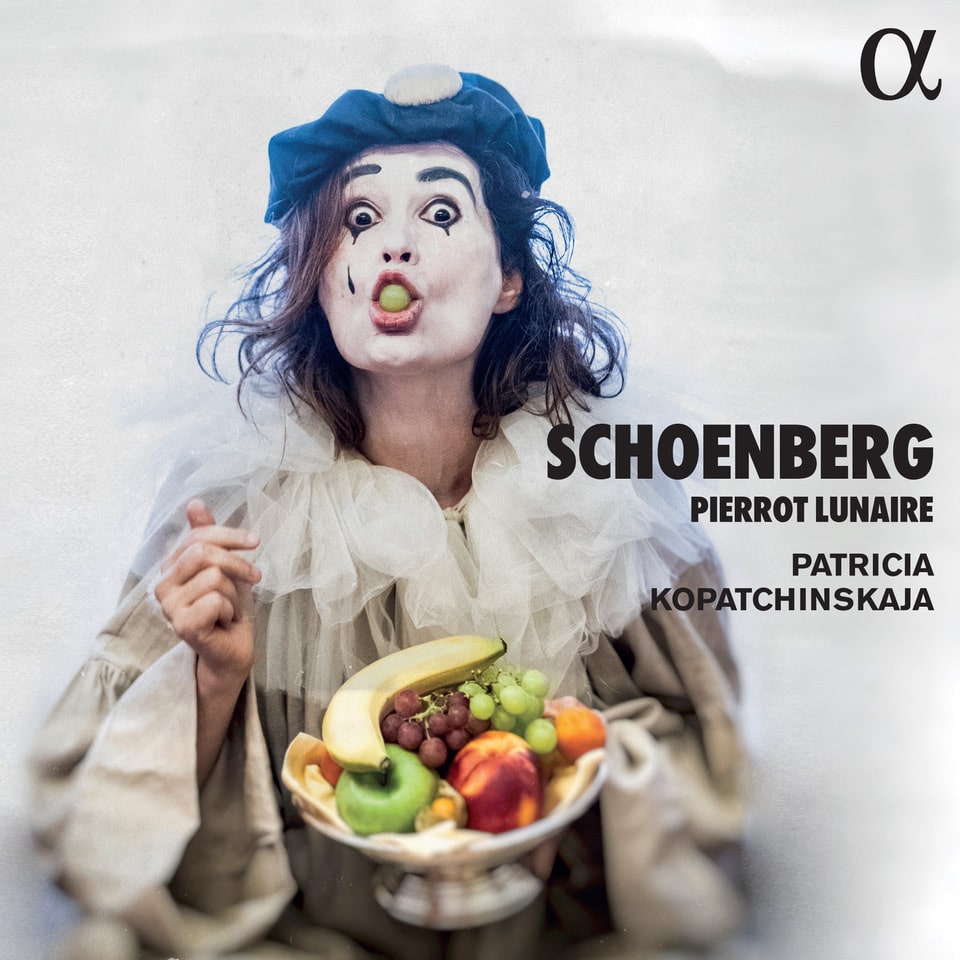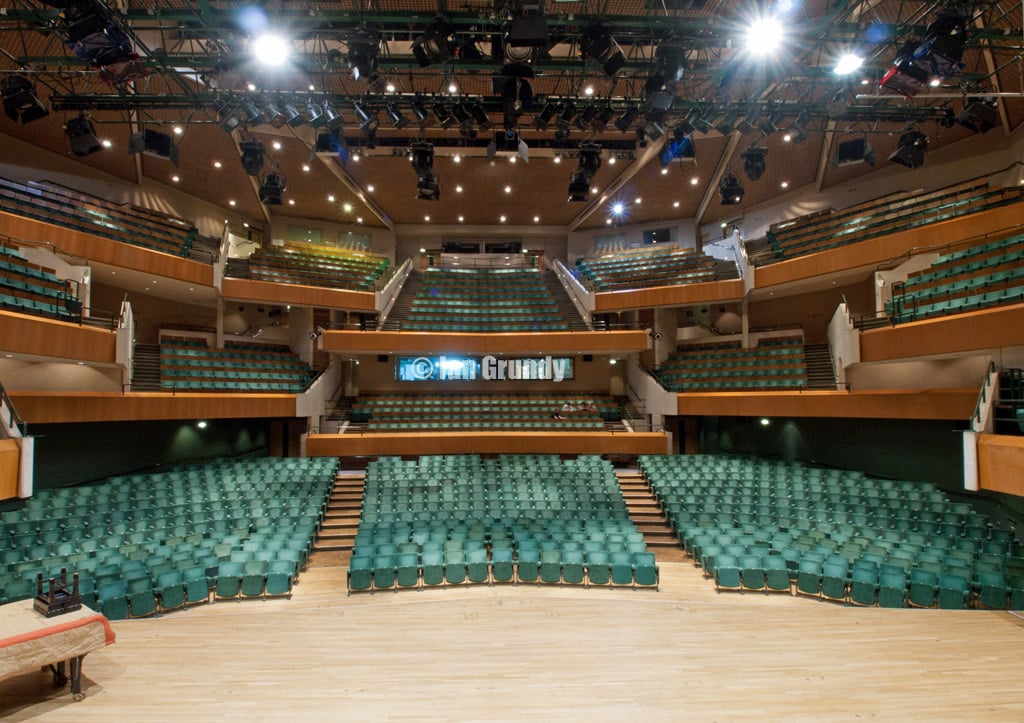Pat Kop: Schoenberg just chokes me up
mainThe unconventional Swiss-based violinist Patricia Kopatchinskaja has a new album coming out in April.
It’s all-Schoenberg, but while she plays the violin in the second half she is also performing the death-defying Sprechgesang vocal role in Pierrot Lunaire.
Pat Kop says: ‘I have played Pierrot many times as a violinist. But I always longed to do the speaker/singer part. When, because of a painful arm condition I could practice less than usual I began to learn Pierrot’s Sprechgesang under the professional guidance of Esther de Bros. After a year’s work, I took the plunge in October 2017 with musicians of the Utah Symphony and Thierry Fischer in the adventurous surroundings of the Sky Salt Lake City Nightclub. I wore a replica of Jean-Gaspard and Charles Deburau’s original Pierrot costume, which goes back to the beginning of the 18th century.’







Brava, PatKop! Can’t wait to hear it!
Don’t stop him, he knows what he is doing.
“he” ?
Schoenberg.
Actually, much of Schoenberg’s work is sprinkled with impractical instructions which suggest he was not always quite sure what to expect. Pierrot is a notorious example with lots of performance problems. Which means that even the ‘best’ performances are an approximation. One of the best is, according to a close following of the score, the recording by Jan DiGaetano & Contemporary Chamber Ensemble from 1970:
http://www.youtube.com/watch?v=2TKh3xvG_x0
Since also the instruments do (a notated form of) ‘Sprechstimme’, i.e. don’t play the expected notes but something around them, DiGaetano follows the style of the players, and does not ‘sing’ too much, and keeps it light, so that the ensemble music can still be heard. A too heavy voice pushes the players away and creates the effect of singing terribly out of tune.
Because there are still so many tonal references in this work, it still works as a tonal piece, and is so much more expressive than whatever postwar atonal imitation. It is a very tragic work about the 20C soul, on the fringe of dying.
Dear JB.
no Sprechstimme in instruments…….what do you mean?
The parts of the instruments almost always surround the tones which would have been expected given the style and the gesture. They do the same as the Sprechstimme: she has to circle around the tone and hardly touch it. All this gives the dizzying effect of being lost, of disintegration. The music is kept more or less ‘together’ by the gestures of the lines, not by the logic of the tones.
In theory it would be possible to write a version where the notes follow the paths suggested by the gesture, but it would be another piece, closer to Debussy. And the singer would have to sing and have melodic lines.
(By the way, Debussy’s songs like the two series of Fetes Galantes, and the Mallarme songs, are on a higher plane than Pierrot, because more subtle and more humane.)
In Salt Lake City!?! . . . that must have been a hoot! . . . (and I’m not saying there’s anything ‘wrong’ with SLC).
Pierrot Lunaire combine hideous texts with the most inspired music Schönberg composed ever. Atonal music can be exceptionally appropriate in drama, e,g when Elektra goes mad in Strauss’ opera, or in Schönberg’s Erwartung. Patricia Kopachinskaja is known for her eccentric performances (which as a rule are not in my taste, poor me :-)), and that makes me curious to check how she managed not to speak while not singing, and other helpful (sadistic?) instructions given by the composer on how the singer is not to follow the score (however, not so curious that I would buy the CD… :-)).
To be noted, a performance of Pierrot Lunaire by Patricia Kopatchinskaja is planned during this summer’s Festival d’Aix-en-Provence , on July the 12th at the beautiful Théâtre du Jeu de paume. It will be coupled with La lontananza nostalgica utopica futura by Luigi Nono.
https://festival-aix.com/fr/evenement/pierrot-lunaire
Luigi’s nightmarish violin improvisation experiment followed by a performance of the evil clown. Parodying a literary personality: ”Horrorshow!”
Much of Pierrot was meant as satire, but the result is so lugubrous that the humorous bit always falls flat, and the borderline insanity remains. As for ms Kop: nobody will notice the wrong notes she speaks.
How do you know that there are wrong notes? I am always amazed how people judge Patkop even before having heard what she did. Was the same with her Vivaldi-CD. Says more about the critic than about his object.
Schoenberg did his best to write as many as wrong notes imaginable. To add more of them, won’t make a difference.
This reminds me of the Fischer-Dieskau/Klemperer story: “Please come to hear me on Tuesday, maestro,” said Fischer-Dieskau. “I’m making my conducting debut.” Klemperer took his calendar out of his pocket, looked at it and said: “Sorry Dietrich, I am singing Winterreise that evening.”
(Cont’d)
DF-D: “Great, Kempy, I’d love to hear you singing.”
I was playing in the international Summer Academy Orchestra at the Salzburg Mozarteum in the 70s and one of the players told me an interesting story. This was that Fischer-Dieskau’s agent had informed F-D that if he conducted again he would resign as his agent.
I believe his conducting ambitions were short lived!!
Talk about killing the goose that lays the golden eggs because it lays one that is bronze!
That’s like Karajan’s rep saying they won’t rep him any more if he gives a piano recital. Sorry, the main gig is just too lucrative for the agent.
Didn’t EMI record Barenboim/F-D in the Schumann Concerto? Also Schubert 5 & 8 (mentioned in producer Suvi Grubb’s memoirs). And I remember a well received Brahms 4.
Good old Mr. Klemps…
Otto the Great.
I heard her Pierrot Lunaire at the Virée Classique in Montréal a few years back (2018, perhaps?). She’s pretty good, actually, including in the sung parts.
I guess there is also a place for visual “artists” like her, but it’s not my cup of tea. I prefer the stoic faces and demeanours of musicians who actually listen to themselves and focus on how they sound. She could use some improvement there.
Loony! Fabulous!
Should keep her day job.
At first you are embarrassed for her and can’t watch. Then you can’t turn away.
In his still very interesting ‘Music Ho!’ from the twenties of the last century, English composer and conductor Constant Lambert says that Pierrot sounds like a Schumann Lieder recital going horribly wrong – claiming Schoenberg’s aesthetic has always remained a 19C German romantic one, in spite of the avantgarde surface.
The general observation was hardly original to Lambert: Schoenberg, himself, often said that he viewed himself as continuing directly in the tradition of Brahms.
Yes, but Schoenberg meant that in a structural sense: the interval sensitivity and poliphonic writing, which he himself combined with Wagnerian chromatic harmony. Schoenberg’s description of what he ‘learned’ from Mozart, Beethoven, Brahms etc. read as hilarious spoofs, as if the sound of that music was entirely irrelevant to its aesthetics.
And his scoring of Brahms’ piano quartet in g shows he did not ‘quite’ understand Brahm’s way of thinking, or he simply denied it.
https://www.youtube.com/watch?v=cQiYttdiZmE
Her Tchaikovsky concerto in LA 3 years ago still leaves a bad taste in my mouth.